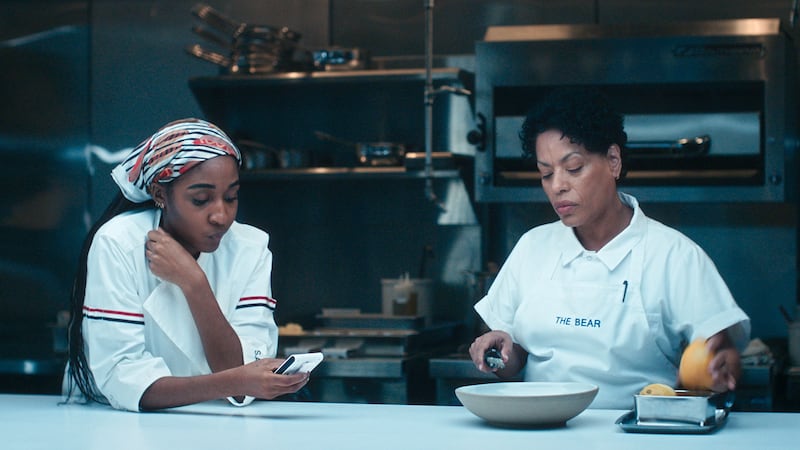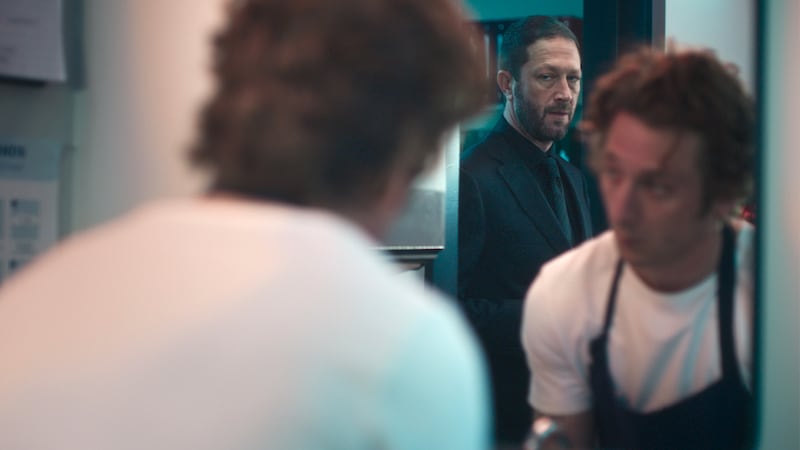If Season 3 of The Bear rankled some fans by being less hyper-frenetic than its first two outings, they’re going to be sorely disappointed by its fourth go-round.
The new season, premiering June 25, focuses on listening, learning, and improving by doing away with one’s worst impulses, cherishing what you have, and seizing the brief moments of opportunity—and happiness—that life gives you.
It’s The Bear as a more mature beast.
Those not craving merely the same old culinary pandemonium will be thrilled to know that the latest iteration of Christopher Storer’s acclaimed FX series is a wonderfully nuanced and touching portrait of combatting loneliness, self-destructive rage, and bitterness and resentment through calm, trust, and compassion. In a break from previous seasons’ chaos, the season is about the recognition that sometimes creation isn’t born from bedlam but, instead, from composure and camaraderie.
(Warning: Some spoilers ahead.)
It’s slightly surprising to discover that The Bear now wants to make viewers feel (tentatively) hopeful, although the path to contentment remains a rocky one for Carmy (Jeremy Allen White), who’s smarting badly from a negative Chicago Tribune review that slammed his restaurant for being a disorganized, disconnected mess.
Yet if that critique stings, it’s also a catalyst for an epiphany. In an opening dream sequence, Carmy recalls (or is it imagines?) a conversation with his deceased brother Mikey (Jon Bernthal) in which he states that “restaurants are special places, right? People go to restaurants to be taken care of. They go to restaurants to celebrate, to relax, to not have to think about anything else for a minute. People go to restaurants to feel less lonely.” When he awakens, Groundhog Day is on his TV, reflecting the repeating-the-same-mistakes rut in which he’s found himself.

A muted Carmy moves through this season of The Bear, finally aware of the fact that the anarchy begat by his endless cursing, screaming, and insanity—such as opting to alter The Bear’s menu on a nightly basis as some sort of self-flagellating challenge to himself—isn’t producing his desired results.
Nonetheless, change isn’t as easy as simply flipping a switch, and Storer’s series spends these 10 episodes charting Carmy and everyone else’s efforts to revise themselves by facing, with a sense of serene rationality, the things (inside and out) they fear and hate.
After three years of maniacal dysfunction, that process is necessary for the sustained mental and physical health of the characters. It’s also, however, vitally important for the future of the restaurant, since as Jimmy (Oliver Platt) and Computer (Brian Koppelman) announce to the staff at outset, the aforementioned review plus unsatisfactory earnings equals an imminent closing—and, to make that literally clear, they install a doomsday clock to let the staff keep track of the approaching end.
This would be cruel if The Bear didn’t already operate under the idea (borrowed from Olivia Colman’s Chef Terry) that “Every Second Counts,” and if—as Tina (Liza Colón-Zayas) remarks during her season-long endeavor to prep pasta dishes in less than three minutes—“There’s always a clock.” Still, if The Bear is a race against a cataclysmic deadline, its pace is far more tempered than before, epitomized by an early trademark montage of ingredients, dishes, cookware, financial ledgers, and faces that Storer (who directs the majority of this run) casts in less frenzied aesthetic terms.

That measured formal approach turns out to be the rule rather than the exception as the show’s protagonists grapple cooly and shrewdly, albeit with great difficulty, with their hang-ups.
Those are legion.
Richie (Ebon Moss-Bachrach) works to accept ex Tiff’s (Gillian Jacobs) impending marriage to good-guy Frank (Josh Hartnett) and its ramifications for his fatherhood to daughter Eva (Annabelle Toomey). Sydney (Ayo Edebiri) struggles to choose to stick with the sinking-ship The Bear or partner with suitor Adam Shapiro (Adam Shapiro), as well as her coping with a dad-centric calamity.
Marcus (Lionel Boyce) has trouble deciding whether to meet up with his estranged father. And Sugar (Abby Elliott) must navigate handling the establishment’s faltering fortunes and, later, sparring with her former BFF (played by one of the season’s excellent cameoing stars).
Having spent years putting its protagonists through the punishing ringer, The Bear now shows them grace by letting them attempt to eschew tumultuousness in favor of appreciation, forgiveness, and togetherness—all of which are bulwarks against the disarray and isolation they dread and loathe.
For Carmy, this means lowering the proverbial temperature of the kitchen, collaborating with his colleagues, and admitting and confronting failures—most notably, those regarding Claire (Molly Gordon) and Donna (Jamie Lee Curtis), the two women in his life with whom he needs to mend fences. Rather than stubbornly stay in the middle of a maelstrom of his own making, Carmy strives, quietly, for a brighter tomorrow.

In a show whose performances continue to be off-the-charts tremendous (highlighted, as usual, by the great Moss- Bachrach and Edebiri), White delivers a revelatory turn, capturing his chef’s personal reckoning with his shortcomings, his strengths, and his desire to carry on in his field with a low-key sorrowfulness and determination that typifies the season as a whole.
R.E.M., Eddie Vedder, and the Who provide familiar soundtrack accompaniment, and yet in a manner similar to its subjects, The Bear fights to find a different way, highlighted by a 69-minute seventh episode set at Tiff and Frank’s wedding that’s all about honesty, healing, and unity—and, thus, is the exact opposite of Season 2’s explosive family-dinner showstopper.
Storer loves the Berzattos, Faks, and those who’ve become part of their unruly extended clan, and like audiences, he wants them to locate the elusive satisfaction and connection they seek. That journey has its inevitable ups and downs, and it culminates with a climactic behind-the-restaurant conversation between Carmy, Sydney, and Richie in which all the guilt, jealousy, fury, regret, and terror that’s been building up inside them (individually and collectively) comes out in a great cathartic burst whose consequences are at once heartening and devastating.
The Bear initially made its name with chaos and madness but the reason it’s become a sensation is its collection of flawed, fanatical characters and their empathetic quests to overcome their deficiencies. Their arduous, ungainly, uplifting transformation is the show’s as well, and in Season 4, it underscores that Storer isn’t a one-trick pony; he’s a genuinely great small-screen dramatist.
The post ‘The Bear’ New Season Is (Thankfully) a Much More Mature Masterpiece appeared first on The Daily Beast.




